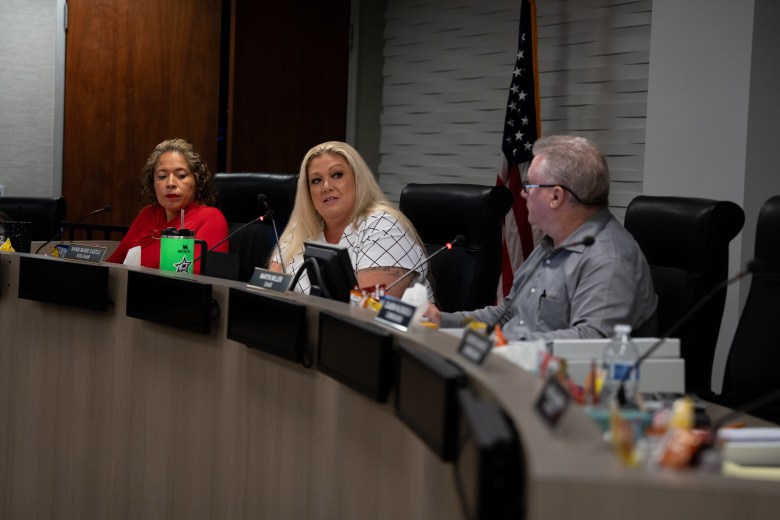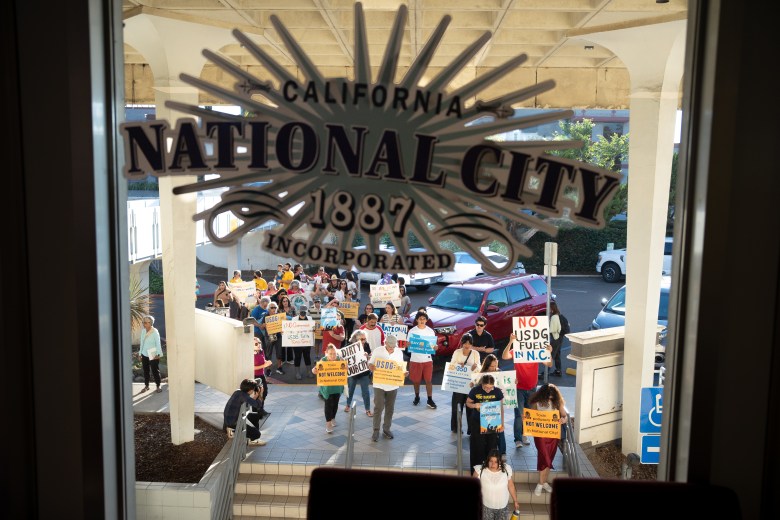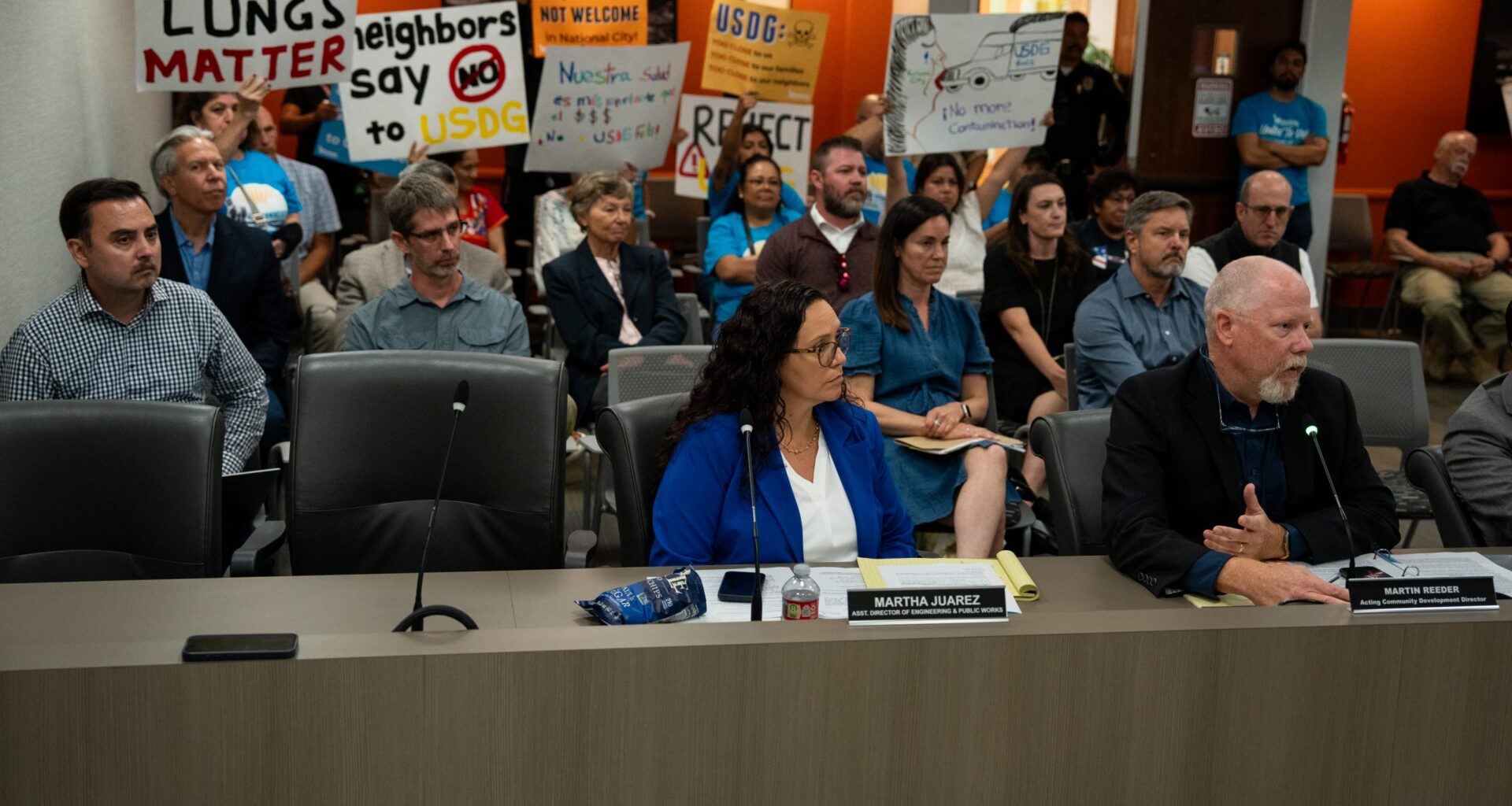Why this matters
West National City is a state-designated “Portside Environmental Justice Neighborhood” slated for reduction of industrial emissions that have historically impacted the community.
National City planning commissioners have blocked a Texas-based company from building a fuel transfer station in a neighborhood the state has recognized for its high asthma rates and included in a program for reducing industrial pollution.
The city’s Planning Commission on Monday voted 4-1 against the USD Clean Fuels project, proposed for a property just off 18th Street, west of Interstate 5. The site is within a half-mile of Kimball Elementary with residential housing in between. Commissioner Claudia Valenzuela was absent, and Commission Chair Richard Miller cast the dissenting vote.
Bill Frerking, the CEO of USD Clean Fuels, said the company could appeal the decision to the National City Council but hasn’t made that decision yet.
The decision deals a significant blow to the project, which has faced public opposition.
On Monday, more than 60 residents filled the meeting hall demanding that the commission deny the project, raising concerns over its proximity to homes, schools and churches. In July, the National School District board signed a proclamation against the project. More than a thousand community members signed a petition citing concerns that increased heavy-duty truck traffic would cause lung-damage, fire risk and noise pollution.
Vice-Chair Randi Castle spoke out against the project and motioned to deny its approval, adding that her child has asthma.
 Vice-Chair of the National City Planning Commission Randi Castle speaks during the USD Clean Fuels discussion at the commission meeting on Sept. 15, 2025. (Philip Salata/inewsource)
Vice-Chair of the National City Planning Commission Randi Castle speaks during the USD Clean Fuels discussion at the commission meeting on Sept. 15, 2025. (Philip Salata/inewsource)
“I would not personally want to walk around and go to the grocery store, because I know all of you in here and see you in the grocery store,” Castle said, “without having good conscience and saying that I stood up for not only my child, but everybody else’s child in here too.”
The Environmental Health Coalition, which has been involved in the community movement opposing the project, organized a protest before the meeting Monday, accompanied by partnering organizations including SanDiego350, Olivewood Gardens and Learning Center as well as the Interfaith Coalition for Earth Justice.
Amy Castañeda, the Environmental Health Coalition’s policy director, celebrated the commission’s decision.
“I feel a lot of gratitude right now for the planning commissioners who took the time to really listen to what community members were saying,” Castañeda said.
 National City residents and advocates march into the National City Planning Commission meeting regarding the USD Clean Fuels fuel transfer station on Sept. 15, 2025. (Philip Salata/inewsource)
National City residents and advocates march into the National City Planning Commission meeting regarding the USD Clean Fuels fuel transfer station on Sept. 15, 2025. (Philip Salata/inewsource)
More than a dozen members from American Federation of Labor and the Congress of Industrial Organizations Local 89 came out in support of the project. The group’s director of political and government affairs said the project would provide local jobs. The group left the room before commissioners voted.
The fuel transfer station would receive biodiesel fuels by train, mix them and ship them out by truck, operating 24 hours a day. The project would require the building of additional rail line.
USD Clean Fuels says it would use approximately 72 trucks per day, mainly active between 6 a.m. and 6 p.m. and that drivers would avoid residential areas, schools and churches. It also says the project would contribute to California’s clean air goals by reducing overall truck use throughout the state.
National City’s own environmental impact report determined that the project would potentially be in conflict with the state’s goals to protect the health of community members in what it calls a “Portside Environmental Justice Neighborhoods” community. The designation recognizes the impacts on communities in the area chronically exposed to emissions from the port, freight, rail and industry.
The commission postponed its decision in June following a contentious meeting during which then-Commissioner Beryl Forman raised alarm over having received a January letter from the California Air Resources Board only three hours before the meeting. The letter, which laid out concerns about the project and its impact on public health, came attached in written public comment.
“That letter noted the Portside Community suffers from the highest air pollution levels in all of California,” Forman said, adding, “yet, we were asked to support an environmentally hazardous project affecting that very area.”
Forman resigned from her position following the June meeting.
Miller, the commission chair, postponed the decision in June citing another letter from the California Coastal Commission that arrived the same day of the meeting. The letter asked the planners for more time to work with the city to address “inconsistencies with the City’s Local Coastal Program (LCP) and the Coastal Act, particularly regarding wetland resources, sea level rise, and environmental justice.”
At Monday’s meeting Miller attempted to propose a motion to approve the project with certain stipulations, including that the trucks shipping the fuel out of the facility use clean fuels. No commissioner seconded his motion.
